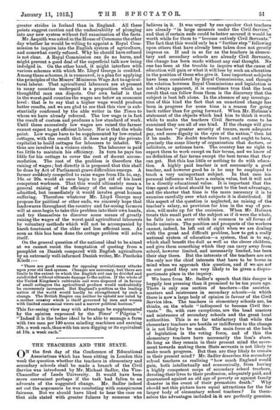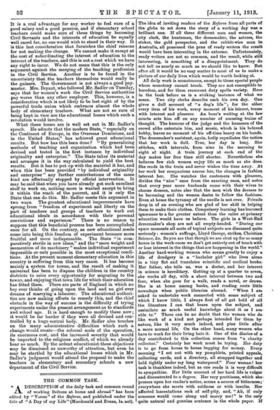THE TEACHERS AND THE STATE.
ON the first day of the Conference of Educational Associations which has been sitting in London this -week the question whether the teachers in elementary and secondary schools shall be made a branch of the Civil Service was introduced by Mr. Michael Sadler, the Vice- Chancellor of Leeds University. It would have been more convenient perhaps if the task bad fallen to an advocate of the suggested change. Mr. Sadler indeed set out the arguments he was combating with conspicuous fairness. But we should have liked to hear the case on that side stated with greater fulness by someone who believes in it. It was urged by one speaker that teachers are already "in large measure under the Civil Service," and that if certain ends could be better secured it would be worth while for them to "become entirely Civil Servants." The fact that this would only be a "further step" following upon others that have already been taken does not greatly impress us. If and in so far as the teachers in elemen- tary and secondary schools are already Civil Servants, the change has been made without any real thought. No one has been at the trouble to inquire what the cause of education will gain or what it will lose by such an alteration in the position of those who give it. Less important subjects have been considered by Royal Commissions, and though the relation between Royal Commissions and legislation is not always apparent, it is sometimes true that the best result that can follow from them is the discovery that the subject is best left alone. In the absence of any investiga- tion of this kind the fact that an unnoticed change has been in progress for some time is a reason for going back rather than for going forward. When Mr. Holman's statement of the objects which lead him to think it worth while to make the teachers Civil Servants come to be examined they are all of one kind. If the change will give the teachers "greater security of tenure, more adequate pay, and more dignity in the eyes of the nation," then let it be made. No doubt teachers have, and ought to have, precisely the same liberty of organization that doctors, or solicitors, or artizans have. The country has no right to expect them to work except on fair terms, and we know of no definition of fair terms except the best terms that they can get. But this has little or nothing to do with educa- tion. A highly paid teacher is not necessarily a good teacher, and however good he is he may be employed to teach a very unimportant subject. In that case his personal influence will have a certain value, but it will not be a directly educational value. It is important that the time spent at school should be spent to the best advantage, and the shorter that time is the more necessary it is to examine carefully over what subjects it is distributed. If this aspect of the question is neglected, no raising of the teacher's salary, no provision for him in the way of pen- sion, will make up for the omission. When Mr. Holman treats this small part of the subject as if it were the whole, he falls into an error which is common to all forms of trade unionism. The position and prospects of the workers cannot, indeed, be left out of sight when we are dealing with the great and difficult problem, how to get a really national system of education—a system, that is to say, which shall benefit the dull as well as the clever children, and give them something which they can carry away from school, however limited, and necessarily limited, has been their stay there. But the interests of the teachers are not the only nor the chief interests that have to be borne in mind when we approach this question, and if we are not on our guard they are very likely to be given a dispro- portionate place in the inquiry.
We learn from Mr. Sadler's speech that this danger is happily less pressing than it promised to be ten years ago. There is only one section of teachers—the assistau masters and mistresses in secondary schools—in which there is now a large body of opinion in favour of the Civil Service idea. The teachers in elementary schools are, he thinks, on the whole "indisposed to become Civil Ser- vants." So, with rare exceptions, are the head masters and mistresses of secondary schools and. the great local authorities. This is so far satisfactory that while the elementary teachers are hostile or indifferent to the change it is not likely to be made. The main force at the back of legislation is the voting force, and of this the elementary teachers have necessarily the lion's share. So long as they remain in their present mind the move- ment towards making them State servants is not likely to make much progress. But then are they likely to remain in their present mind ? Mr. Sadler describes the secondary school teachers as realizing "how much England would gain, both intellectually and economically, from having a, highly competent corps of secondary school teachers. devoting their lives to their profession, adequately paid, and guaranteed against an old age of poverty or against family disaster in the event of their premature death." Why should not this picture have equal attractions for the far larger body of elementary school teachers ? In them- selves the advantages included in it are perfectly genuine.
It is a real advantage for any worker to feel sure of a good salary and a good pension, and if elementary school teachers could make sure of these things by becoming Civil Servants and the interests of education be equally well cared for, no one would wish to stand in their way. It is this last consideration that furnishes the chief reasons for not making the change. We cannot make it except at the cost of subordinating the interest of education to the interest of the teachers, and this is not a cost which we have any right to incur. We do not mean that this is the only argument against the merging of the teaching profession in the Civil Service. Another is to be found in the uncertainty that the teachers themselves would really be the gainers. The Government is not always a good pay- master. Mrs. Bryant, who followed Mr. Sadler on Tuesday, says that for women's work the Civil Service authorities pay worse than any other employer. This, however, is a consideration which is not likely to be lost sight of by the powerful trade union which embraces almost the whole body of elementary teachers. What are not so sure of being kept in view are the educational losses which such a revolution would involve.
What these losses are is well set out in Mr. Sadler's speech. He admits that the modern State, "especially on the Continent of Europe, in the Overseas Dominions, and in the United States," has achieved great educational results. But how has this been done ? "By generalizing methods of teaching and organization which had been devised and tested in the first instance by individual originality and enterprise." The State takes its material and arranges it in the way calculated to yield the best results. But it has to put up with the material it has, and when this has been provided "by individual originality and enterprise" any further contributions of the same kind are effectually stopped by official intervention. It may be said that when you have already got such excellent stuff to work on, nothing more is wanted except to bring it within the reach of the poorest, and it is only the State that can do this. Mr. Sadler meets this argument in two ways. The greatest educational improvements have sprung from "freedom of experiment and liberty on the part of teachers and groups of teachers to work out educational ideals in accordance with their personal convictions and experience." There is no reason to suppose that this beneficial process has been accomplished once for all. On the contrary, as new educational needs come into being this freedom of experiment becomes more fruitful and more indispensable. The State "is com- paratively sterile in new ideas," and the "mere weight and momentum of its machinery" makes individual experiment impossible or only possible in the most exceptional condi- tions. At the present moment elementary education in this country is suffering from this very cause. It has become mainly a system for towns, and the result of making it universal has been to dispose the children in the country districts to seize every opportunity for migrating to the towns, and enjoying that town life for which their education has fitted them. There are parts of England in which no boy ever thinks of going upon the land and no girl ever dreams of marrying a labourer. The educational authori- ties are now making efforts to remedy this, and the chief obstacle in the way of success is the difficulty of trying experiments under the present arrangement as to standards and school age. It is hard enough to modify these now ; it would be far harder if they were all devised and con- trolled by a huge central body. Mr. Sadler also touches on the many administrative difficulties which such a change would create—the colossal scale of the operation, its enormous cost, and the increased severity that would be imparted to the religious conflict, of which we already hear so much. By the ardent educationist these objections may be dismissed as unworthy of attention, but even he may be startled by the educational losses which in Mr. Sadler's judgment would attend the proposal to make the teachers in elementary and secondary schools a new department of the Civil Service.











































 Previous page
Previous page